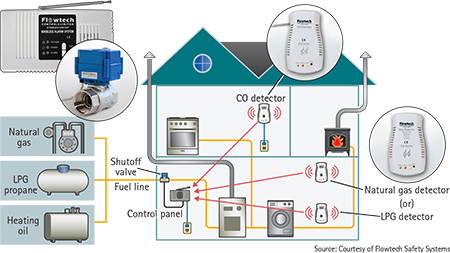
BY DANIEL P. SHERIDAN
If gone unchecked, carbon monoxide (CO) and gas emergencies have the potential to cause a lot of death and destruction. When natural gas and propane accumulate in a space and reach their explosive levels, the results can at times be catastrophic. CO, “The Silent Killer,” is just as deadly but in a different way; it is odorless, tasteless, and colorless. CO poisoning results in an estimated 50,000 emergency room visits in the United States annually and 450 accidental deaths, according to the Centers for Disease Control and Prevention.
Every day, thousands of homes in the United States and around the world will develop a gas or CO leak from aging piping systems. Gas, by its nature, is very explosive; if a leak goes unnoticed, reaches a level of five percent, and has an ignition source, an explosion will occur.
It doesn’t take much of a spark to ignite the gas. In fact, something as innocent as a static charge can cause a devastating event. Propane may be even more dangerous; its explosive level is as low as 2.9 percent, and it is heavier than air, which means that it will accumulate in the lowest levels of a residence.
Systems now exist in the United States to help prevent these catastrophes. The new Flowtech Safety Systems® works with independent gas; oil; and heating, ventilation, and air-conditioning companies to install the system in commercial and residential structures. The Flowtech Safety Systems helps ensure that gas leaks and CO dangers are mitigated before they harm life or property.

Flowtech Safety Systems is comprised of three basic components: a CO detection unit or a gas detection unit, based on its intended use; a control panel; and the award-winning, patented Peerless® shutoff ball valve. Once gas is detected, the shutoff ball valve activates, cutting off the fuel source.
The sensor is a patented Nemoto® industrial grade device. Flowtech Safety Systems detectors conform to EN50291 or EN50194 standards, which exceeds the Underwriters Laboratories standards.
Once as little as one percent of gas is detected, the system sends a signal to a control panel. The control panel activates the ball valve on the shutoff near the gas supply and shuts off the gas to the residence. Once the gas is shut down, it cannot be restarted until the leak has been rectified. The system will continue to sense the gas, keeping the premises safe.
The same holds true for the CO sensors. If 30 parts per million in CO is detected for more than two hours, the system will shut off the gas to the offending appliance.
In cold weather, when the ground is frozen or snow is on the ground, natural gas can potentially migrate into homes because it becomes trapped and can’t dissipate into the atmosphere. Although a shutoff system may not prevent the gas from accumulating, the sensor would alert the residents of the danger. The problem is even worse in areas where fracking is taking place. The gas migrating into the house does not contain mercaptan, which means it cannot be detected by smell, leaving just the methane accumulating unnoticed.
Methane is like CO-it is colorless, odorless, and tasteless. The Flowtech Safety Systems would alert occupants well before gas reaches its explosive level.
DANIEL P. SHERIDAN is the president and CEO of Flowtech Safety Systems. He is a 29-year veteran of the Fire Department of New York, where he is a battalion chief. He is also a national instructor and the founder and chief operating officer of Mutual Aid Americas, an international nonprofit training group to assist firefighters. Previously, he instructed at the Rockland County (NY) Fire Academy. He authored Chapter 12 (Forcible Entry) for Fire Engineering’s Handbook for Firefighter I and II.

